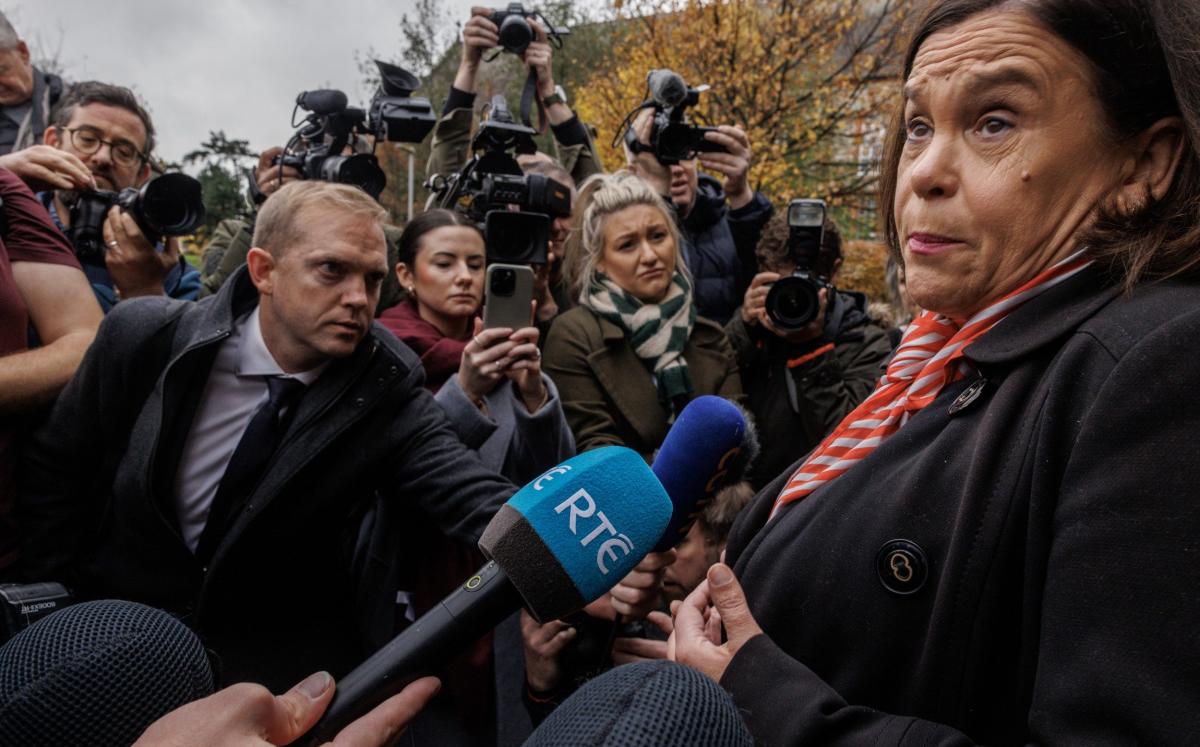
Sinn Fein has won Ireland’s election, according to exit polls on Friday night, but looks certain to be shut out of power by its rivals after failing to get enough votes to enter government for the first time.
Mary Lou McDonald’s party was predicted to get 21.1 per cent in an election that hangs on a knife-edge, with its nearest rival just 0.1 per cent behind and all three main parties separated by just 1.6 per cent.
The exit polls point to the renewal of the coalition between Fine Gael and Fianna Fail, the two centre-Right parties that have dominated Irish politics for more than 100 years of the Republic’s history.
“We will always work to make life better for workers, families and communities. To unite Ireland. To build a brighter future for all,” said Ms McDonald, 55, who led her party to victory despite a string of scandals.
If the exit polls are borne out, it will be a blow to Sinn Fein’s hopes of forcing a united Ireland referendum by 2030, which were raised by the party winning a hat trick of election victories in Northern Ireland.
Both Fine Gael and Fianna Fail see Irish unity as a long-term aspiration, rather than short-term policy goal like Sinn Fein.
Credit: RTÉ News
Fine Gael, led by taoiseach Simon Harris was predicted to get 21 per cent in the Ipsos/B&A exit poll on behalf of The Irish Times and RTE, which is accurate to a margin of error of 1.4 per cent. It suggests he was able to overcome a “Gordon Brown” moment.
Mr Harris was first in the polls before a damaging video clip of him dismissively walking away from a disability care worker went viral and his lead evaporated in the dying days of the campaign.
Fianna Fail, led by Micheál Martin, was expected to get 19.5 per cent after taking a narrow lead in the polls in the final week of the campaign after slipping from first in a sign voters are not yet prepared to forgive the party its role in Ireland’s economic collapse in 2008.
Historic rivals Fine Gael and Fianna Fail formed a coalition government in 2020 after Sinn Fein won its highest-ever vote share in that year’s general election; citing their incompatibility with the nationalists’ Left-wing policies and paramilitary past as the former political wing of the IRA.
The leaders of Fine Gael and Fianna Fail, the current prime minister and deputy prime minister, both ruled out forming a coalition with Sinn Fein in their final televised debate before polling day. In 2020, Sinn Fein won the most seats, followed by Fianna Fail and Fine Gael in third.
Going into Friday’s election, Fianna Fail held a narrow lead over a rising Sinn Fein, while Fine Gael had slipped to third in the polls from first.
There was less than two per cent between all three parties, which were each on about 20 per cent.
Independents could play role
The count begins on Saturday morning and could last days because of Ireland’s proportional representation system, which sees eliminated candidates’ votes redistributed during multiple rounds of counting.
Independents could play a role in the formation of the next government if Fine Gael and Fianna Fail fall short of an 88-seat majority.
Mr Harris, 38, is hoping to secure a record fourth successive term for Fine Gael, which has been in government for the last 14 years.
Sinn Fein had held a commanding lead in the polls for two years until it was overtaken by Fine Gael in June, after Mr Harris replaced the unpopular Leo Varadkar in April to become the youngest-ever taoiseach at the age of 37.
He outflanked Ms McDonald on migration and cutting benefits, as Sinn Fein alienated supporters with pro-immigration policies before losing local elections to the government parties.
Sinn Fein rallied in the final week, focusing heavily on housing and claiming to be the only alternative to Fine Gael and Fianna Fail.
Patchy record on housing
Mr Harris had to defend the government’s patchy record on housing in a country where the average age of a first-time buyer is 39 and house prices have risen 92 per cent since 2015.
Figures published on Friday showed that the number of people in homeless accommodation in Ireland was at a record high of almost 15,000 people, including 4,645 children.
For Peta Scott, 54, a healthcare worker and mother of four, housing woes meant it was “a challenge” for her children to stay in Ireland.
Mr Harris also faced accusations of profligate public spending after launching a €10.5 billion budget to appease voters fretting about housing and childcare costs before calling the snap election.
EMEA Tribune is not involved in this news article, it is taken from our partners and or from the News Agencies. Copyright and Credit go to the News Agencies, email news@emeatribune.com Follow our WhatsApp verified Channel




